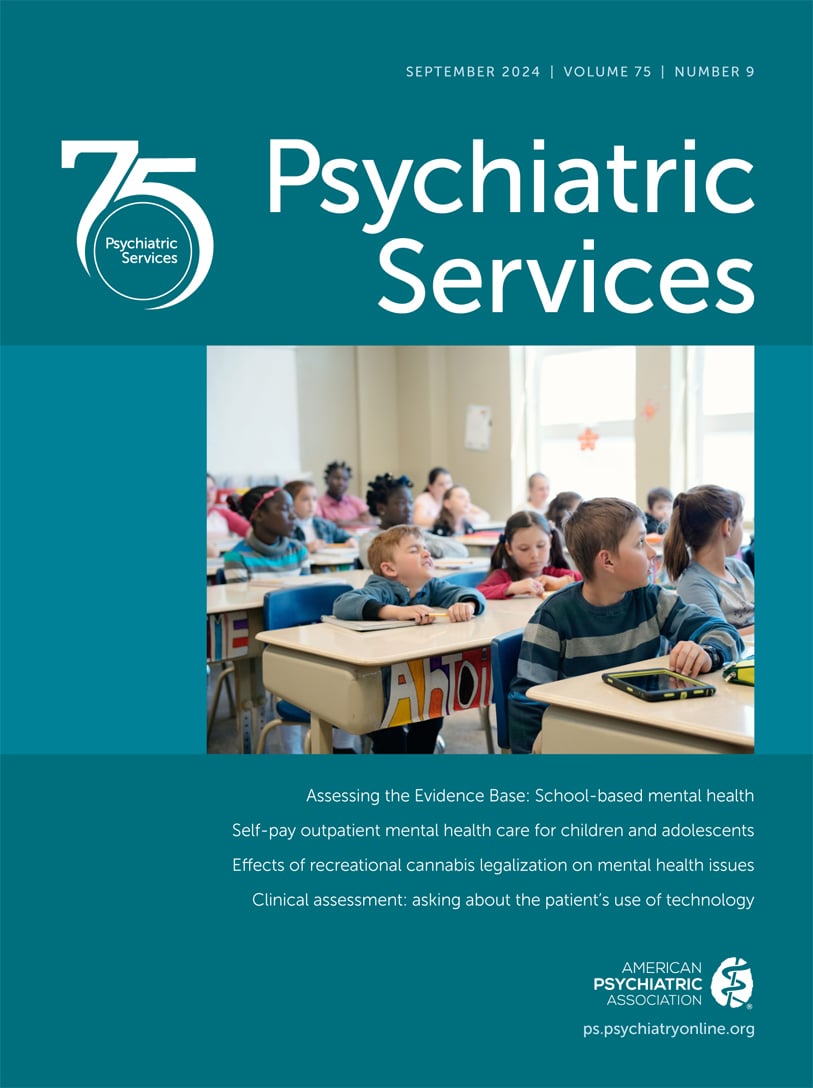Psychiatric Services
- Volume 72
- Number 10
- October 2021
Taking Issue
Articles
Publication date: 18 March 2021
Pages1118–1125Objective: This study tested the hypothesis that fidelity of clinics to Zero Suicide (ZS) organizational practices is inversely related to suicidal behaviors of patients under clinical care. Methods: Using cross-sectional analyses, the authors examined the ...
https://doi.org/10.1176/appi.ps.202000525Articles
Publication date: 04 March 2021
Pages1126–1133Objective: This study estimated the prevalence of self-reported symptoms of mental health problems and treatment utilization in a U.S. national sample of community college students and made comparisons with data from a sample of students at 4-year ...
https://doi.org/10.1176/appi.ps.202000437Articles
Publication date: 04 March 2021
Pages1134–1138Objective: The authors aimed to identify prominent financing approaches for coordinated specialty care (CSC) of patients with first-episode psychosis, alignment or misalignment of such approaches with sustained CSC implementation, and CSC provider ...
https://doi.org/10.1176/appi.ps.202000710Articles
Publication date: 17 May 2021
Pages1139–1144Objective: The authors sought to evaluate the acceptability, feasibility, and initial outcomes of the delivery of a group cognitive-behavioral therapy (CBT) mental health intervention for mothers in the Temporary Assistance for Needy Families (TANF) ...
https://doi.org/10.1176/appi.ps.202000492Articles
Publication date: 23 April 2021
Pages1145–1150Objective: Integration of general medical care and mental health care is a high priority for individuals with serious mental illnesses because of their high risk of morbidity and early mortality. The Bridge is a peer-led, health navigator intervention ...
https://doi.org/10.1176/appi.ps.201900615Articles
Publication date: 17 May 2021
Pages1151–1159Objective: The author examined patient demographic, clinical, payment, and geographic factors associated with admission to low-safety inpatient psychiatric facilities. Methods: Massachusetts all-payer 2017 discharge data (N=39,128 psychiatric patients) were ...
https://doi.org/10.1176/appi.ps.202000657Articles
Publication date: 11 May 2021
Pages1160–1167Objective: Insurance status and continuity may affect access to and quality of care. The authors characterized patterns of and changes in insurance status over 1 year among people with first-episode psychosis (FEP), comparing insurance patterns with adults ...
https://doi.org/10.1176/appi.ps.201900571Articles
Publication date: 08 July 2021
Pages1168–1177Objective: After young adults experience a first episode of psychosis, many express a need for help with education and employment. A quality improvement collaborative (QIC) launched in the Netherlands aimed to reinforce vocational recovery by improving ...
https://doi.org/10.1176/appi.ps.201900342Reviews & Overviews
Publication date: 15 June 2021
Pages1178–1192Objective: The beliefs that people with psychosis hold about causes of their illness (causal beliefs) can affect their choice to adhere to treatment and engage in mental health services. However, less is known about causal beliefs of mental health ...
https://doi.org/10.1176/appi.ps.202000460Special Articles
Publication date: 24 February 2021
Pages1193–1198The complex interactions between the 2019 coronavirus disease (COVID-19) pandemic, structural racism, and mental health inequities have led to devastating health, economic, and social consequences. The intersection of these three conditions, which meets ...
https://doi.org/10.1176/appi.ps.202000725Global Mental Health Implementation Science Protocol
Publication date: 15 June 2021
Pages1199–1208Background: Hazardous drinking imposes a major public health burden worldwide, especially in low-income countries such as Mozambique. Implementation of the Screening, Brief Intervention, Referral to Treatment (SBIRT) approach to address problem drinking is ...
https://doi.org/10.1176/appi.ps.202000086Brief Reports
Publication date: 21 May 2021
Pages1209–1212Objective: This study sought to characterize the incidence of COVID-19 illness, hospitalization, and death among congregate and noncongregate cohorts served by a New York City behavioral health agency. Methods: From March 9 to May 3, 2020, data were ...
https://doi.org/10.1176/appi.ps.202000620Brief Reports
Publication date: 07 May 2021
Pages1213–1217Objective: Child psychiatry access programs (CPAPs) help increase access to mental health services. This study aimed to provide information on the types of pediatric primary care clinicians (PPCCs) who call Maryland’s CPAP. Methods: Descriptive statistics ...
https://doi.org/10.1176/appi.ps.202000292Open Forum
Publication date: 15 April 2021
Pages1219–1221Evidence-based practices (EBPs) are frequently proposed as an approach to close the quality chasm in behavioral health treatment, and many U.S. municipalities are investing in EBPs as a primary way to improve the quality of care delivered to individuals ...
https://doi.org/10.1176/appi.ps.202000209Open Forum
Publication date: 22 April 2021
Pages1222–1224The COVID-19 pandemic has catalyzed structural changes in the public mental health sector, including a shift to telehealth and telesupervision, financial strain for community mental health organizations and clinicians, and risk of burnout among clinicians ...
https://doi.org/10.1176/appi.ps.202000509Promoting High-Value Mental Health Care
Publication date: 22 April 2021
Pages1225–1228The COVID-19 pandemic has been expected to lead to substantial increases in need for behavioral health care. A population health framework can facilitate the development of interventions and policies to promote the equitable distribution of care across ...
https://doi.org/10.1176/appi.ps.202000546Technology in Mental Health
Publication date: 25 May 2021
Pages1229–1232With more than 10,000 mental health apps available, consumers and clinicians who want to adopt such tools can be overwhelmed by the multitude of options and lack of clear evaluative standards. Despite the increasing prevalence of curated lists, or app ...
https://doi.org/10.1176/appi.ps.202000803Culture & Mental Health Services
Publication date: 09 June 2021
Pages1233–1236This column describes the development and impact of an innovative three-part online cultural sensitivity training program for faculty and staff of an academic medical center’s psychiatry department. The goal of the training was to equip faculty and staff ...
https://doi.org/10.1176/appi.ps.202000015Law & Psychiatry
Publication date: 13 August 2021
Pages1237–1239Incarceration can disrupt healthy sleep, and insomnia is associated with psychiatric symptoms and poor general medical health among incarcerated people. In recent years, considerable litigation has arisen over sleep deprivation in U.S. jails and prisons. ...
https://doi.org/10.1176/appi.ps.202100438Editor’s Choice
Past Issues
View Issues Archive
Vol. 75 | No. 12

Vol. 75 | No. 11

Vol. 75 | No. 10
